‘Don’t think of ChatGPT as something unimaginable. Once you understand how it works, you can develop an AI tool too!’ Wong Fai repeats these words to his students each semester on the first day of class. Prof Wong is an associate professor in the Department of Computer and Information Science of the Faculty of Science and Technology (FST) at the University of Macau (UM). Recognised as a pioneer of machine translation in Macao, Prof Wong’s dedication to innovative teaching earned him the UM Teaching Excellence Award earlier this year. In this article, Prof Wong shares how he guides students to develop creative artificial intelligence (AI) tools and works to expand their career prospects.
Teaching the development of AI tools
The emergence of the ChatGPT chatbot signifies the crucial role of AI in future technologies. Staying at the forefront of AI development, UM has introduced related courses into programmes in fields such as computer science and big data. Among these courses, Prof Wong’s ‘Natural Language Processing’ provides a comprehensive explanation of the operating system of AI chatbots and guides students through the large and complex neural network models behind these AI tools.
At the start of every semester, instead of diving straight into the basics, Prof Wong begins the first class by discussing the practical applications and commercial value of AI tools. One example he gives is the natural language processing technology used in Google Translate and ChatGPT. Prof Wong explains, ‘The reason I start with these examples is to help students understand the connection between the course and current technological trends, as well as AI’s influence on our lives, which in turn, can spark their interest in learning about this field.’
As a pioneer of machine translation in Macao, Prof Wong developed the world’s first Chinese-Portuguese machine translation system before the handover of Macao to China in 1999. In the classroom, he leverages his extensive teaching and research experience to guide students to understand the fundamentals of deep learning in AI and acquire the methods and skills to develop AI models. This includes designing AI tools for specific purposes such as writing poems, translating literary works, smart education, detecting AI-generated texts, and evaluating text quality.
Prof Wong says, ‘Whether it is a machine translation tool or a chatbot, these applications operate based on probability calculations. Once students grasp the deep learning mechanism of AI language systems, they are equipped to develop their own generative AI tools.’
The organic integration of martial arts and AI
Before taking Prof Wong’s course, many students held the belief that developing AI tools on their own was an impossible task. However, Prof Wong’s course has completely changed this perspective, as evidenced by numerous interesting AI projects showcased in FST’s annual final year project exhibition in recent years. One notable example is ‘iTaolu’, developed by FST student Angela Wong. iTaolu means ‘smart taolu’, and taolu refers to the set routines in Chinese martial arts. iTaolu is therefore an AI-based application that generates Nanquan routines (Nanquan is a style of Chinese martial arts that originated in southern China).
Prof Wong says, ‘Angela is a Nanquan champion in the World University Games. After I learned about her background during our discussion about her project, we made the decision to develop an automated system that generates Nanquan routines by using a large language model, and that was iTaolu.’
By analysing Nanquan movements from past international competitions, iTaolu can generate new routines to assist martial arts athletes in their training and competition preparations. Angela expresses her gratitude, saying, ‘Thanks to Prof Wong’s guidance, I was able to integrate Nanquan and AI. He patiently mentored me whenever I faced challenges. iTaolu would not have been possible without his support.’
Prof Wong tailors his teaching methods to suit his students’ abilities, encouraging them to integrate their interests and their research. This teaching approach not only stimulates students’ creativity, but also enables them to apply their knowledge in real-world scenarios, thereby promoting continuous knowledge enhancement and innovation. Prof Wong has created a metaphor to summarise his teaching philosophy: ‘Teaching plants curiosity. Research shines to grow it into knowledge.’
Expanding development prospects for students
Prof Wong is deeply invested in the future prospects and career development of his students. Over the years, he has served as a bridge between the university and industry, facilitating internships for students at leading enterprises such as Huawei, Alibaba, and Tencent. In addition, he provides mentorship for students participating in domestic or international AI competitions. This allows students to gain experience and showcase their research capacity.
Prof Wong says, ‘Most of my students continue their studies in AI or work in technology enterprises after graduation. Our corporate partners are very satisfied with the performance of UM students, with some securing job offers immediately after their internships.’
UM alumnus Samuel Zeng is among Prof Wong’s most outstanding students. During his studies at UM, Samuel established China’s first unstaffed café, Tao Café, which earned him a spot on the list of ‘35 Innovators Under 35 for China’ by MIT Technology Review in 2017. More recently, Samuel founded the AI technology start-up AutoArt and developed the significant AI model ‘ArkModel’. His company is a testament to the cultivation and development of ‘new quality productive forces’ in Xiangzhou, Zhuhai.
Reflecting on his journey, Samuel shares, ‘Prof Wong often arranged visits to enterprises for students, and invited enterprise representatives to speak at the university. These experiences provided us with direct insights into business operations and industry trends, as well as opportunities to forge connections with professionals in the industry. With Prof Wong’s endorsement, I secured an internship at Alibaba during my doctoral studies. This work experience allowed me to translate theoretical knowledge into real-world applications, and address challenges together with team members in the company.’
Samuel is grateful for Prof Wong’s mentorship and support, saying ‘My time at UM has had a profound impact on both my personal and professional development.’
Advancing UM programmes to meet international standards
In 2009, UM initiated a mission to align FST curricula more closely with international standards. To this end, Prof Wong and his colleagues formed a curriculum reform task force to enhance the teaching content and programme structure of the faculty. Their collaborative efforts led to a number of FST programmes receiving accreditation from the Washington Accord in 2014. The recognition by this international accreditation agreement for undergraduate professional engineering academic degrees signifies that UM degrees hold the same professional value as those offered in the signatory countries of the Washington Accord.
Prof Wong explains, ‘Many students may not understand the significance of this accreditation. Essentially, it means that when UM graduates seek employment in any of the signatory countries, their academic qualifications are recognised. They are acknowledged as having met the academic requirements for entry to the practice of engineering. This recognition has significantly broadened their career prospects.’
Today, computer science is a pivotal discipline driving innovation at UM. Due to its high citation frequency, the university’s computer science field ranks among the top one per cent in the Essential Science Indicators (ESI) database. In addition, UM has cultivated numerous AI software engineers and multidisciplinary professionals adept in computer technology applications.
The eternal challenge for educators
Throughout his career, Prof Wong has been a relentless explorer in teaching and research. He not only incorporates cutting-edge technologies like AI into his teaching, but also mentors students in utilising these technologies for innovation. For Prof Wong, the pursuit of educational innovation entails consistent integration of new concepts, methods and technologies into teaching practices in order to enhance effectiveness.
Prof Wong observes that it has become increasingly rare for students to take notes using pen and paper. Therefore, he believes that teaching methods should be continuously innovated. He notes, ‘Not only do we need to adapt to students’ learning habits, but also provide them with personalised instructions according to their individual needs. This is the process of teaching optimisation. Moreover, it represents an eternal challenge for us educators.’
Profile of Prof Wong Fai
Prof Wong Fai is an associate professor in the Department of Computer and Information Science of the Faculty of Science and Technology at the University of Macau. He also leads the university’s Natural Language Processing & Portuguese-Chinese Machine Translation Laboratory (NLP2CT). In 1999, Prof Wong developed the world’s first Chinese-Portuguese electronic dictionary, establishing himself as a pioneer in machine translation research in Macao. He has since developed several machine translation tools, including the ‘Online Chinese-Portuguese-English Computer Aided Translation Platform’, which has significantly facilitated Chinese-Portuguese translation work in Macao.
In 1995, Prof Wong obtained his bachelor’s degree in software engineering from UM. In the same year, he was recommended by the university to study at the Institute of Systems and Computer Engineering in Portugal. He joined UM as a principal investigator in 1996 for a joint research project between UM and Tsinghua University on Chinese-Portuguese machine translation. Prof Wong received his master’s degree in software engineering from UM in 1999, and his PhD in control science and engineering from Tsinghua University in 2005.
Prof Wong specialises in natural language processing, machine translation, computational linguistics, and machine learning. He has published more than 170 academic papers. His contributions have been recognised with the Second Prize in the Science and Technology Progress Award and the Second Prize in the Technological Invention Award of the Macao Science and Technology Award, which he received in 2012 and 2022, respectively.
Text: Kelvin U, UM Reporter Li Yuwei
English translation: Bess Che
Photos: Editorial Board, with some provided by the interviewees
Source: My UM Issue 135
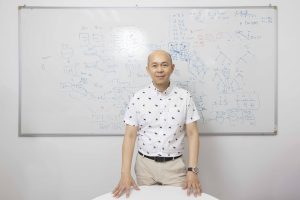
Prof Wong Fai

Prof Wong receives the UM Teaching Excellence Award
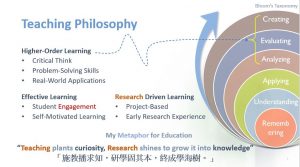
Prof Wong’s teaching philosophy
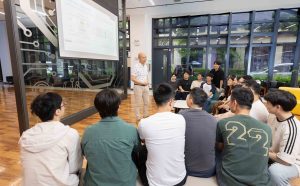
Prof Wong meets with his students every week

Angela Wong wins the Nanquan championship at the World University Games
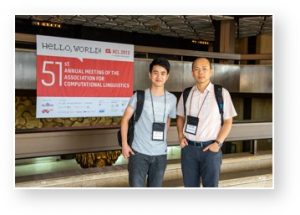
Prof Wong and Samuel Zeng
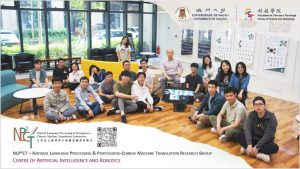
Prof Wong and students of the Natural Language Processing & Portuguese-Chinese Machine Translation Laboratory
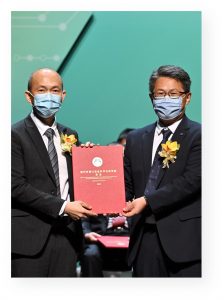
Prof Wong receives the Second Prize in the Technological Invention Award of the Macao Science and Technology Award
